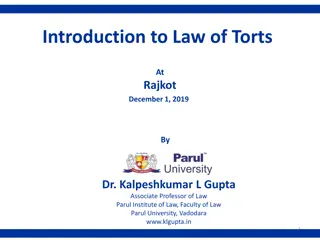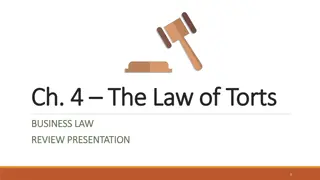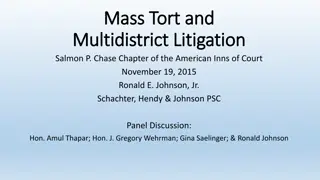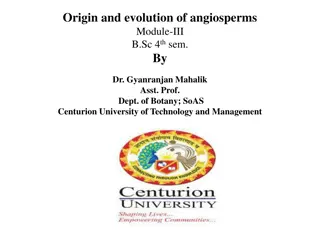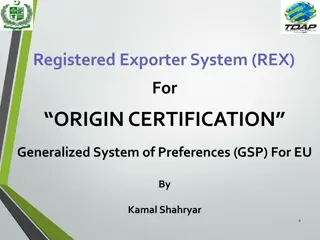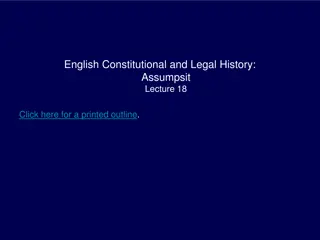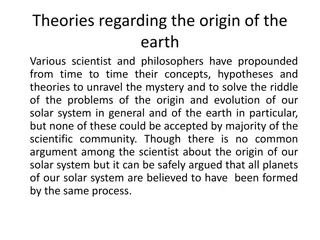Understanding the Law of Torts: Origin, Theories, and Objectives
Exploring the origin, theories, definition, objectives, history, and development of the law of torts. From the French origin of the word "tort" to the primary objectives of providing relief, imposing liability, and deterring harmful acts, this branch of law plays a crucial role in addressing civil wrongs and injuries caused by others.
Download Presentation

Please find below an Image/Link to download the presentation.
The content on the website is provided AS IS for your information and personal use only. It may not be sold, licensed, or shared on other websites without obtaining consent from the author. Download presentation by click this link. If you encounter any issues during the download, it is possible that the publisher has removed the file from their server.
E N D
Presentation Transcript
Issues to be Discussed Origin of Law of Tort Theories of Law of Tort Definition of Law of Tort Objectives of Law of Tort History and Development of Law of Tort Distinction with other Branches of Law
Origin of Law of Torts The word tort is of French origin. It is derived from the Latin word tortam , which means twist and implies, twisted or tortious conduct. In the early period of English law, the word tort was used as a synonym for wrong but later it acquired a specific meaning which was much narrower than the meaning of the word wrong. For example: Throwing garbage from the window of anyone s home which fall upon and hit any stranger who is walking in the road.
Theories of Law of Tort There are mainly two theories regarding this brunch of law. The first theory was given by Sir Frederic Pollock in 1887. The first theory is that, every civil wrong is a tort unless there are some other justifications by law. The second theory was propounded by Sir John Salmond. The second theory is that, there are some specific kinds of tort. For being a tort it must fulfill some specific and preset conditions or criteria. That means an injury can be tort only if it fits in the principles governing particular tort recognized by law.
Definition of Law of Tort The prominent writer Salmond defines tort as a civil wrong for which remedy is a common law action for unliquidated damages and which is not exclusively a breach of a contract or a breach of a trust or other merely equitable obligation . According to Winfield, Tortious liability arises from the breach of the duty primarily fixed by law; this duty is towards person generally and its breach is redressible by an action of unliquidated damages .
Objectives of Law of Tort The primary objectives of the law of tortare a) to provide relief to injured parties for harms caused by others; b) to impose liability on parties responsible for the harm; c) and to deter others from committing harmful acts.
History and Development of Law of Tort The modern law of tort owes its origin from the English Common Law. It is not a codified law. In Indian sub-continent also this branch of law remains largely un-codified. The field of tort still, in most part, remains an uncharted territory in Bangladesh. Unfortunately, such an important branch of law which deals with the remedies that any person can claim for his suffering of an injury by any wrongful act committed by other individuals or public authorities is being treated with such(disregard) that there is a propensity among the lawyers to completely disregard it as having no application in Bangladesh. However, with an increasingly keen interest shown by a few lawyers, academicians and judges, things are looking up lately.
Case Law Case: Catherine Masud vs Md. Kashed Miahand others This is a case of private law tort. It is significant because it was the first case filed under Section 128 of the Motor Vehicle Ordinance, 1983 which provides for the existence of Motor Accident Claim Tribunal. However, the case was then transferred from the tribunal of Manikganj to the High Court Division on the basis of a petition made by the claimant under Article 110 of the Constitution. The fact is that on 13.08.11, the deceased Tareq Masud along with nine others was returning from Manikganj to Dhaka in a microbus. When the microbus arrived at a place named Joka on the Dhaka Aricha Highway, collusion took place between the microbus and a bus named Chuadanga Deluxe Paribahan coming from the opposite direction. As a result of the accident, five passengers of the microbus suffered instant death and all the surviving passengers were taken to the hospital.
Case Law The question arose as to whether it was the bus driver s fault that caused the accident and whether the owners would be held vicariously liable. Both the parties brought their witnesses who were examined and cross-examined. However, there were discrepancies among the accounts of the witnesses brought by the defendant. Moreover, the bus driver did not have any valid driving license and the bus itself had no fitness certificate either. After examining the witnesses, the court was convinced that the bus driver was driving the bus recklessly through the wrong lane. The court went further and concluded that since the owners had the knowledge about the absence of fitness certificate of the bus and valid driving license of the driver, they would be held vicariously liable.
Distinction between Tort and Crime It has to keep in mind that tort and crime are two different things. Crime is immoral act and it requires mens rea but in terms of tort it is only a wrong and mens rea is merely absent. Interest violated in Tort is interest of an individual only but a crime violates the interest of a society as a whole. In terms of crime, the State prosecutes the criminals as it fails to protect the interest of the people but tort regards to any individual person and for this reason a suit is brought by that individual person whose legal interest is violated. In case of a tort, a suit is filed in a Civil Court whereas in terms of crime, prosecution is launched in a Criminal Court. The object of the law of crimes is to maintain peace and order of the society; on the other hand the object of the law of tort is to ensure the recovery of loss of that person whose legal interest has been violated. Remedy tort (unliquidated) crime (liquidated + confinement).
Distinction between Tort and Breach of Contract The law creates the duty to protect the interest of the people in case of law of tort whereas that duty is settled by an agreement between persons in case of breach of contract. In case of a contract, the duty is towards the parties of the agreement but in case of tort the duty is not to violate the interest of every other person in the world. In case of law of tort, unliquidated damages are given as a remedy; that means compensation is given the amount of which is unspecified which will be decided by the court. But the remedy given in case of breach of contract is liquidated in nature; that means, the amount of which can be specified between the parties of the agreement and it can be mentioned in the contract.
Distinction between Tort and Breach of Trust Historically the law of tort owes its origin to the common law of England whereas the law relating to trust owes its origin to the Equity court or the Court of Chancery. The damages given as a remedy for breach of trust is liquidated in nature but as regards tort it is unliquidated or unspecified.
Class Activity "There is no scope of using the principles of the Law of Tort in Bangladesh" - Evaluate this statement. (Marks=15) While answering the question, keep in mind the following things: What is the law of tort? (5) Why it is not a codified law? (5) What are the obstacles to have its application in Bangladesh? (5)
Communication Blended Learning Center Enrolment Key : tortfsummer20 Google classroom Code: Section A quev2ib Section B jefuydj Facebook Page: Ferdousi Begum E-mail: ferdousi@daffodilvarsity.edu.bd Mobile: 01839789058 What s app : +8801839789058
Thank you Stay Online Stay Connected


